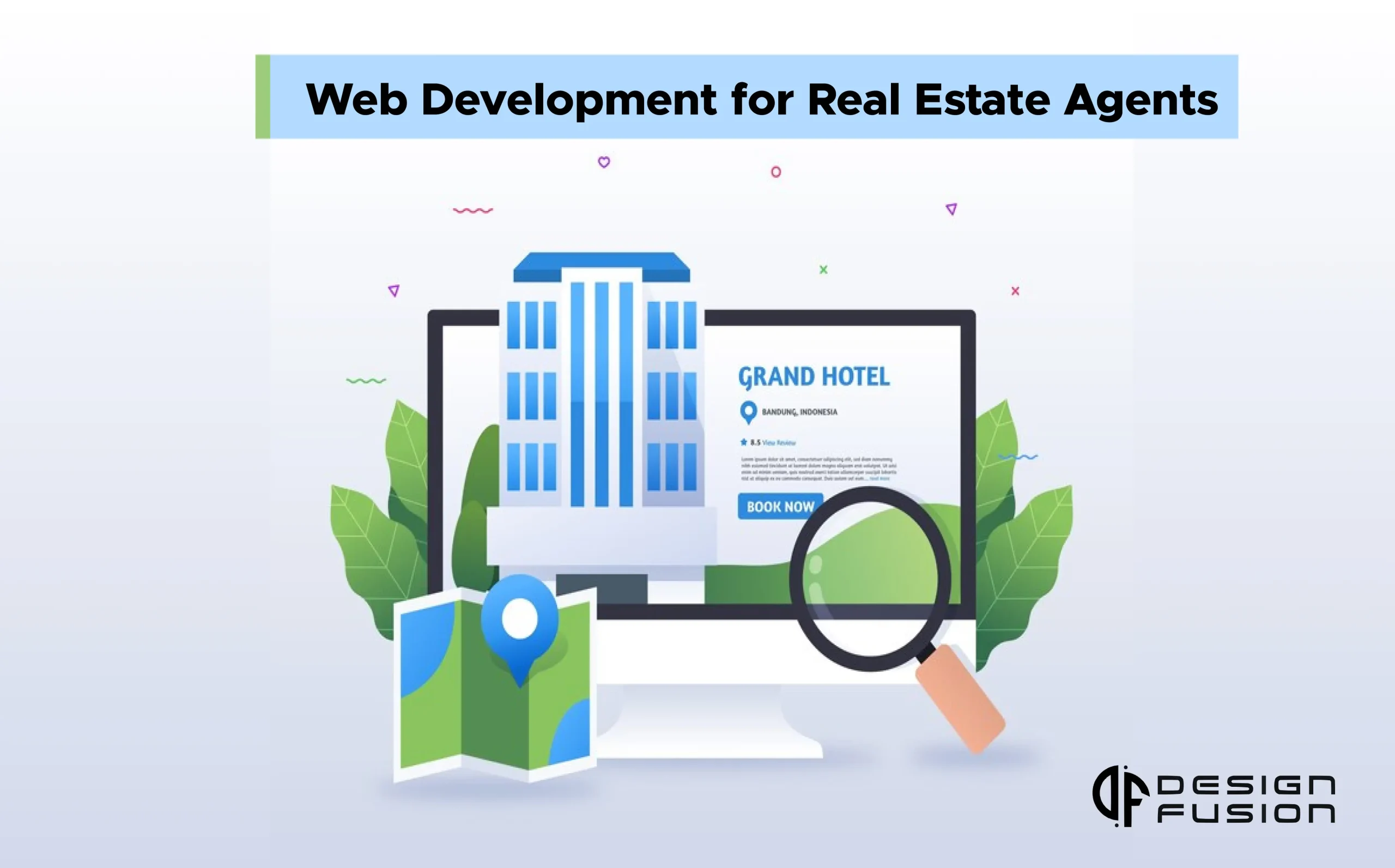Website development for real estate agents involves creating an engaging, user-friendly, and informative online platform where agents can connect with clients and present property listings effectively. Let’s dive into the essential elements of website development:
In the world of real estate, a robust online presence is more important than ever. As potential buyers and sellers increasingly turn to the internet to research properties and find their dream homes, real estate agents need to invest in well-designed websites to stay competitive. In this comprehensive guide, we will explore the key aspects of website development and design for real estate agents, with a strong emphasis on effectively showcasing properties. In this blog, we will focus on elements/content/functionality needed specifically for real estate websites.

User-Friendly Navigation
A user-friendly website is the cornerstone of online success. Your site should offer a clear and intuitive navigation structure. Categorize properties by type, location, price range, and other relevant criteria. This makes it effortless for visitors to find what they’re looking for, increasing their time on your site.
Navigational Clarity
Think of your website’s navigation as the map that guides visitors on their journey. It should be clear, intuitive, and easy to understand. Users should be able to quickly figure out how to move around your site without any confusion, because:
how to move around your site without any confusion, because:
- Engagement: When users can easily find what they’re looking for, they’re more likely to stay longer on your website. This increased engagement offers you a better chance to capture their interest and potentially convert them into clients.
- Positive User Experience: A clear navigation structure enhances the overall user experience. Users appreciate a site that respects their time and offers an efficient way to access information. A user-friendly website reflects professionalism and attentiveness to the needs of your potential clients.
Property Categorization
Categorizing properties on your website is like organizing a library – it makes finding the right book (in this case, property) a breeze. Properties can be grouped by various criteria, including:
- Type: Residential, commercial, industrial, or agricultural, for instance.
- Location: Different neighborhoods, cities, or regions.
- Price Range: Properties falling within specific price brackets.
By providing these categorizations, you’re essentially putting the power in the hands of your visitors. They can filter properties based on their preferences and requirements, which is a huge time-saver and ensures that they see only the listings that matter to them.
Enhancing User Engagement
When users can effortlessly find properties that align with their criteria, they are more likely to stay on your website, explore more listings, and potentially reach out to you for inquiries. This results in increased user engagement, which is a key metric for online success.
Moreover, a user-friendly website doesn’t just stop at property categorization. It also includes intuitive search features, clear property descriptions, and, ideally, high-quality images and virtual tours. These elements collectively create an environment that encourages users to interact with your listings and, ultimately, reach out to you for more information or to schedule a viewing.
In essence, a user-friendly website is not only about making your site look good; it’s about making it work effectively for your visitors. It’s about creating an experience that respects their time, caters to their needs, and, in the context of real estate, helps them find the property of their dreams. By offering a clear and intuitive navigation structure and well-organized property categorization, you’re setting the stage for a successful online presence in the competitive real estate market.
Mobile Optimization

The advent of mobile devices has transformed the manner in which individuals connect to the internet. Whether at home, on the go, or during a property viewing, individuals rely on their mobile devices to search for real estate listings, read about the local market, and connect with agents. The statistics are clear: a significant portion of your website’s traffic is likely to come from mobile users.
Seamless Access
Mobile optimization ensures that your website is not only accessible on mobile devices but that it provides a seamless and enjoyable browsing experience. Here’s why this is crucial:
- User Experience: A mobile-friendly website is easier to navigate on smaller screens, with touch-friendly buttons, optimized images, and a layout that adapts to various screen sizes. This translates to a better user experience, making it more likely that visitors will stay and explore your site.
- Faster Loading Times: Mobile-optimized websites are designed for speed. Mobile users often have limited patience for slow-loading sites, so ensuring quick access to information is vital for retaining their interest.
- Higher Engagement: An engaging mobile experience can lead to increased user engagement. Users are more likely to browse listings, view property details, and, ultimately, get in touch with you if your website is mobile-friendly.
Google’s Emphasis on Mobile-Friendly Sites
In addition to user experience, search engine optimization (SEO) is a critical consideration for your website’s visibility. Google, the most widely used search engine, places significant importance on mobile-friendliness. Here’s why this matters:
- Search Ranking: Google ranks mobile-friendly websites higher in search results. This means that if your website is not optimized for mobile, it may not appear prominently in search listings, potentially limiting its visibility to potential clients.
- Mobile-First Indexing: Google uses a mobile-first indexing approach, meaning it primarily uses the mobile version of the content for ranking and indexing. If your website isn’t mobile-friendly, it could negatively impact its search engine ranking.
Staying Competitive
In the fiercely competitive real estate industry, maintaining a forward-looking approach is paramount. Possessing a mobile-optimized website isn’t merely a choice; it has become an indispensable requirement. It ensures that you can reach and engage with potential buyers and sellers, wherever they are, and whatever device they’re using.
By embracing mobile optimization, you’re not only providing a better experience for your website visitors but also positioning yourself for success in the digital age of real estate. It’s a strategic move that can set you apart from competitors and help you connect with clients more effectively. In summary, mobile optimization is not merely a trend but a fundamental requirement for any real estate website aiming to thrive in the mobile-centric world we live in today.
High-Quality Visuals
Captivating visuals are the cornerstone of effective property showcasing on your real estate website. They have the power to engage potential buyers, convey the essence of a property, and leave a lasting impression. Let’s delve deeper into why investing in high-quality visuals is a must for real estate agents:
The Visual First Impression
In the world of real estate, the saying “a picture is worth a thousand words” couldn’t be more accurate. When potential buyers visit your website, the first thing that catches their eye is the visual representation of the properties you have on offer. High-quality visuals, including images and videos, create an instant and powerful first impression.
Professional Photography
Investing in professional photography is non-negotiable. Professional photographers are skilled in capturing properties in the best light, both literally and figuratively. Here’s why professional photography matters:
- Image Quality: Professional photographers use high-end equipment to capture high-resolution images. These images are sharp, clear, and showcase every detail of the property.
- Composition: Photographers have an eye for composition and know how to frame shots to highlight a property’s strengths. Professional photographers have the knack for making even compact spaces appear open and welcoming.
- Lighting: Proper lighting is crucial for photography. Professionals understand how to use natural and artificial light to create bright and welcoming images.
- Editing: Post-processing is a key part of professional photography. Photographers can enhance colors, correct imperfections, and optimize images for online viewing.
Virtual Tours
Virtual tours take property showcasing to the next level. They allow potential buyers to take a virtual walk through a property from the comfort of their own home. Virtual tours offer several advantages:
- Immersive Experience: Virtual tours provide an immersive experience that static images cannot match. They give potential buyers a real sense of what it’s like to be inside the property.
- Convenience: Buyers can explore the property at their own pace, stopping to look at details that interest them. This convenience is especially valuable for long-distance buyers.
- Time and Cost Savings: Virtual tours reduce the need for physical property viewings, saving both you and your clients time and potentially reducing the number of wasted visits.
- Competitive Advantage: Offering virtual tours can set you apart from competitors who rely solely on images. It signals a commitment to using the latest technology to enhance the client experience.
Creating a Lasting Impression
High-resolution images and virtual tours help create a lasting impression on potential buyers. They allow buyers to visualize themselves living in the property and can generate an emotional connection that is essential for closing a deal.
The investment in captivating visuals not only showcases the property effectively but also reflects your commitment to providing a top-tier service. Buyers are more likely to trust and engage with an agent who goes the extra mile to present properties in the best possible light.
In summary, professional photography and virtual tours are invaluable tools for real estate agents looking to showcase properties effectively. They provide a visual gateway for potential buyers to connect with the properties you represent and, by extension, with you as their trusted agent. By investing in these high-quality visuals, you can differentiate yourself in a competitive market and leave a lasting impression on your clients.
Property Search Functionality

Implementing a robust property search feature on your real estate website is more than just a convenience for users; it’s a powerful tool for engaging visitors and helping them find the properties that match their specific criteria. Here’s an in-depth exploration of the importance and implementation of this feature:
The Importance of Robust Property Search
- User-Centric Experience: A property search feature that caters to users’ specific needs and preferences enhances the overall user experience. It shows that you understand your clients and are dedicated to making their property search as seamless as possible.
- Efficiency: Buyers and sellers appreciate efficiency. A robust search tool allows them to quickly filter through listings to find the properties that meet their criteria. This not only saves their time but also keeps them engaged on your website.
- Improved Conversions: Users who can easily find what they’re looking for are more likely to convert into leads or clients. A well-designed search feature is, in essence, a lead generation tool.
- Competitive Advantage: In the highly competitive real estate market, offering advanced search functionality sets you apart from other agents and websites. It conveys a sense of professionalism and meticulous attention to even the smallest details.
Customized Search Functionality
To truly streamline the property search process and keep users engaged, consider the following customization options:
- Property Type: Allow users to filter listings by property type, such as houses, apartments, or commercial spaces.
- Location: Enable users to search by city, neighborhood, or any other relevant geographical criteria.
- Price Range: Implement filters for price ranges, which help users narrow down their options based on their budget.
- Number of Bedrooms and Bathrooms: These are critical criteria for many buyers. Allowing users to specify their desired number of bedrooms and bathrooms is a significant advantage.
- Additional Features: Consider filters for additional features like swimming pools, garages, gardens, and more, depending on the types of properties you offer.
- Advanced Filters: For more sophisticated users, advanced filters, such as lot size, year built, and specific amenities, can be a valuable addition.
- Saved Searches: Give users the option to save their custom searches. This encourages them to return to your site for updates and new listings, further increasing engagement.
Prominently Displayed Search Bar
A well-designed search bar should be prominently displayed on your homepage, ensuring it’s the first thing users notice when they arrive on your site. This means it should be:
- Visible: The search bar should be immediately visible without the need for scrolling or extra clicks.
- Attractive: Design it to be visually appealing but not distracting. A clean and professional appearance is key.
- User-Friendly: The search bar should be easy to use, with clear labels and simple instructions.
User-Friendly Search Results
Once users initiate a search, make sure the search results are user-friendly. Display property listings in a clear and organized format, with high-quality images and concise descriptions. Include features like sorting options, map views, and the ability to save listings for future reference.
In summary, a robust property search feature is a cornerstone of a successful real estate website. It not only streamlines the property search process but also enhances the user experience and increases engagement. By customizing search functionality to meet users’ specific criteria and prominently displaying a user-friendly search bar on your homepage, you create a valuable tool for clients and potential leads. A well-executed property search feature can be the difference between a user quickly leaving your site and them becoming a satisfied and engaged visitor.
Conclusion
In conclusion, the world of real estate is increasingly moving online, and the effectiveness of your web presence can be a game-changer for your success as a real estate agent. To showcase properties effectively, your website should be a well-crafted blend of user-friendly navigation, mobile optimization, captivating visuals, and robust search functionality.
A user-friendly website offers a clear and intuitive path for visitors, making their exploration of property listings effortless. It’s the starting point for engaging potential buyers and sellers, encouraging them to stay longer and find the properties that match their criteria.
Mobile optimization ensures that your website is accessible to the ever-growing mobile audience. This is not just a matter of convenience; it’s a necessity in an era where users rely on their smartphones and tablets to explore the real estate market. Google’s preference for mobile-friendly websites also impacts your search engine rankings, making it essential for visibility.
Captivating visuals, including high-resolution images and virtual tours, create a lasting impression and enable potential buyers to connect emotionally with the properties you represent. Professional photography and virtual tours offer an immersive experience that static images simply can’t match.
A robust property search feature takes the user experience to the next level. Customized search functionality empowers visitors to filter listings based on their specific criteria, allowing them to efficiently find properties that match their desires and budget. This not only saves time but also increases the chances of conversions and returning visitors.
Prominently displaying the search bar on your homepage and ensuring user-friendly search results are critical steps in engaging potential clients. The search bar should be visible, attractive, and easy to use, while the search results should present property listings in a clear and organized format.
By integrating these elements into your real estate website, you’re not only creating a platform for showcasing properties effectively but also establishing your professionalism and commitment to your clients’ needs. In the competitive world of real estate, your website can be a powerful differentiator, attracting and retaining clients while making the property search process a more enjoyable and efficient experience for all. As you adapt and optimize your website for the digital age, you position yourself for success in the dynamic and ever-evolving real estate market.


